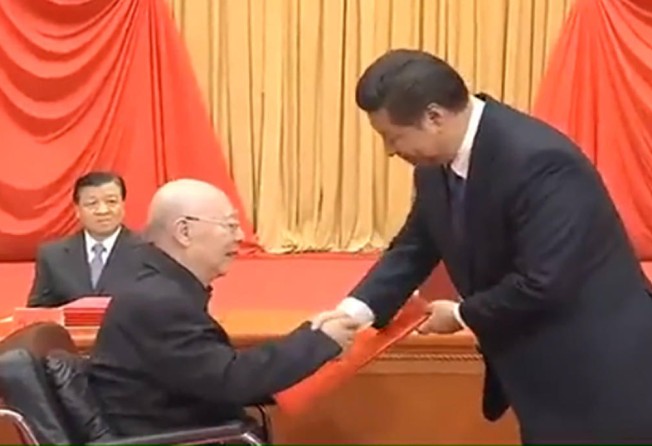Yu Min, 'father of China's H-bomb', wins top science award
Highest honour for veteran nuclear physicist whose involvement in defence project was so secret that even his wife didn't know about it

Veteran nuclear physicist Yu Min - dubbed the "father of China's hydrogen bomb" - has received the country's top science award.
Yu, 89, an academic with the Chinese Academy of Sciences who has been involved in research into nuclear weapons since the 1960s, was presented with the National Highest Science and Technology Award by President Xi Jinping at a ceremony yesterday, mainland media reported. The award comes with a 5 million yuan (HK$6.3 million) cash prize.
Yu was a leading scientist in designing the country's hydrogen bomb, winning a medal for his contribution to "two bombs, one satellite" - China's self-reliant national defence programme - in 1999.
China detonated its first hydrogen bomb in 1967, a little more than two-and-a-half years after the country's first atomic bomb test - much less time than the seven years and three months the United States took to develop a hydrogen bomb after its first atomic test.
Nuclear weapon projects were highly classified in the 1960s so Yu's name remained a secret until 1988, when he officially retired. Even his wife had no idea of his involvement in the project before then, according to the Legal Evening News.
After solving one key problem in 1965, Yu reportedly used code to relay his breakthrough to Deng Jiaxian, another scientist who played an instrumental role in developing China's atomic and hydrogen weapons.
Yu reportedly phoned Deng and told him that he "hunted a squirrel" that had an "uncommon physical structure", and "needed more manpower to help with dissection", as a hint for his new findings. Deng rushed to Shanghai from Beijing after the phone call, the newspaper reported.
Yu, a Hebei native, graduated from Peking University. He did not study overseas and had few chances to interact with foreign experts, according to the website people.com.cn
A total of 24 scientists have received the award in previous years, including the father of hybrid rice Yuan Longping, and urban planner Wu Liangyong. Physical chemist Zhang Cunhao and nuclear weapons expert Cheng Kaijia shared last year's award.
Meanwhile, 318 cutting-edge scientific research projects - including network computing, methods for converting methanol to olefins, and the Tianhe-1 supercomputer - received national science awards for 2014, according to the State Council.